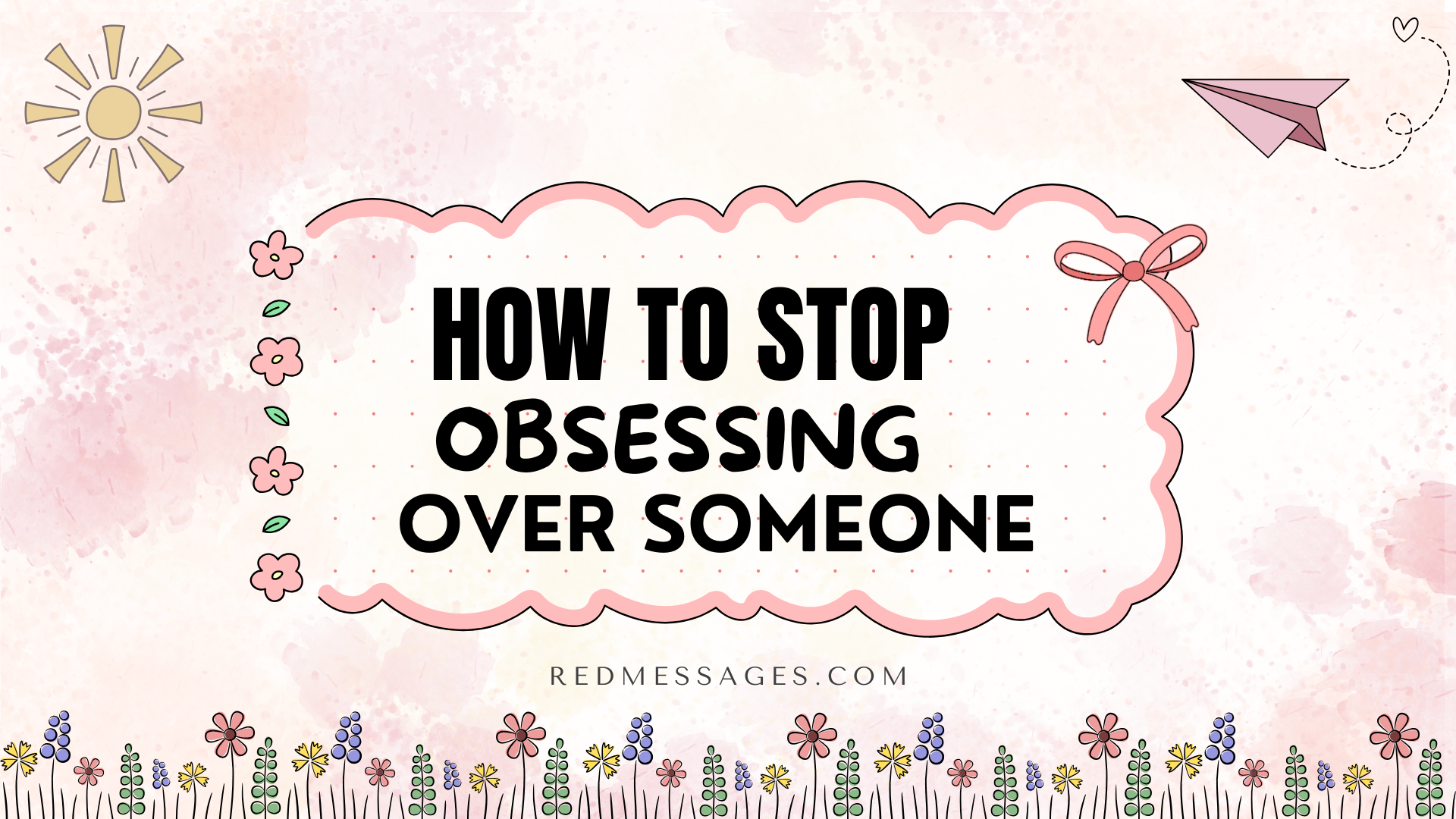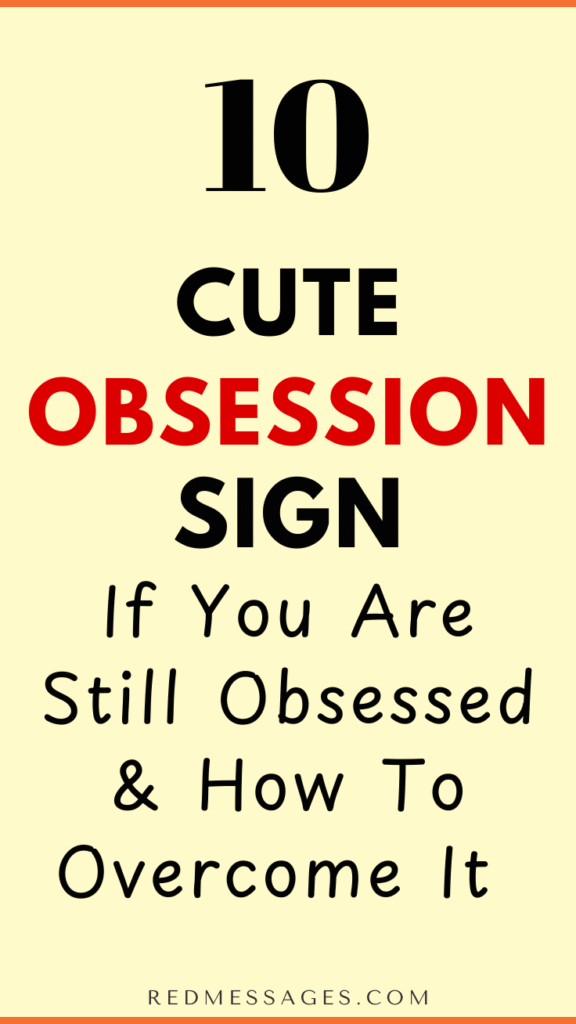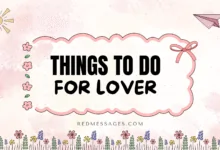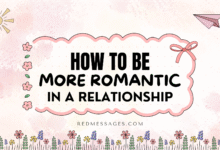How to Stop Obsessing Over Someone: 14 Helpful Ways

Hey there! Let’s be real for a hot minute, we’ve all been there. That person who just won’t leave your brain alone, no matter how hard you try.
Maybe it’s your ex who keeps popping up in your thoughts like an unwanted notification. Or perhaps it’s that crush who doesn’t even know you exist, yet somehow manages to rent space in your head 24/7.
I get it. As someone who’s spent over seven years helping people navigate the messy world of relationships (and yes, I’ve been in those obsessive shoes myself).
I can tell you that breaking free from obsessive thoughts isn’t just possible, it’s essential for your mental health.
The thing is, when we’re stuck in this cycle, it feels like we’re drowning in our own thoughts. But here’s what I’ve learned through both my professional experience and personal journey: you have more control than you think. You just need the right tools to take it back.
Why Do We Obsess Over People Anyway?
Before we jump into the how-to fix it part, let’s talk about why this happens. Our brains are basically wired to seek connection and attachment.
When someone becomes emotionally significant to us, whether through a relationship, unrequited love, or even just intense attraction, our brain creates these neural pathways that keep leading us back to thoughts of them.
It’s like your brain has created a highway that leads straight to “Thinking About Them Town,” and every time you try to take a different route, you somehow end up back on that same road. Annoying? Absolutely. Normal? You bet.

1. Limit Contact With Them
Okay, this one’s going to sting a little, but we need to start here. The first rule of getting someone out of your head is to get them out of your daily life, at least temporarily.
I’m talking about:
- Deleting their number (yes, really)
- Unfollowing them on social media
- Avoiding places where you know they hang out
- Not texting them “just to check in”
Look, I know this feels harsh. One of my clients, Sarah, told me it felt like “cutting off a limb” when she had to block her ex on Instagram.
But here’s the thing, every time you interact with them or see updates about their life, you’re basically watering a plant you’re trying to kill.
Pro tip: If you work together or share mutual friends, you can’t completely avoid them. That’s fine. Just minimize unnecessary contact and keep interactions brief and professional.
2. Remove Reminders Of Them From Your Environment
Time for some emotional decluttering! Walk around your space right now. What do you see that reminds you of them?
That hoodie they left behind? Box it up. The photo of you two from that amazing weekend? Take it down. Even that specific coffee mug that reminds you of your morning routine together, yep, that needs to go too.
I’m not saying throw everything away forever (though sometimes that’s the healthiest choice). But right now, your environment should support your healing, not sabotage it.
Here’s what I tell my clients: Your home should feel like a sanctuary, not a museum of past relationships. Create a space that reflects who you’re becoming, not who you were with them.
3. Stay Busy With Activities And Hobbies
Ever notice how obsessive thoughts love to creep in when you’re bored? It’s like they’re just sitting there waiting for an empty moment to pounce.
The solution? Don’t give them the chance.
This doesn’t mean you need to become a productivity robot (trust me, that’s not sustainable). It means filling your time with things that genuinely interest and fulfill you:
- Take that art class you’ve been thinking about
- Start learning a new language
- Join a hiking group or sports team
- Volunteer for a cause you care about
- Pick up that book that’s been collecting dust
The key is choosing activities that require your full attention. Passive activities like watching TV might not cut it because your mind can still wander.
But when you’re focused on learning guitar chords or perfecting your pasta recipe, there’s no mental space left for obsessive thoughts.
4. Focus On Self-Improvement And Personal Goals
Here’s where things get exciting! Instead of pouring all that emotional energy into thoughts about them, let’s redirect it into something that actually benefits you.
What have you been putting off because you were too caught up in relationship drama? Maybe it’s:
- Getting that promotion you’ve been eyeing
- Finally organizing your finances
- Starting that side business
- Learning to cook something more complex than instant ramen 🙂
I had a client named Marcus who channeled his post-breakup energy into training for a marathon. Not only did it give him something to focus on. But crossing that finish line gave him a sense of accomplishment that had nothing to do with his ex. That’s the kind of energy shift we’re going for.
Set goals that excite you and create a vision of your future that’s so compelling, you won’t want to waste time looking backward.
5. Practice Mindfulness And Meditation To Control Your Thoughts
Okay, I know what you’re thinking. “Meditation? Really? I can barely sit still for five minutes without thinking about them!”
But hear me out. Mindfulness isn’t about emptying your mind completely, it’s about learning to observe your thoughts without getting swept away by them.
Think of it this way: your obsessive thoughts are like clouds passing through the sky of your mind. You don’t have to grab onto every cloud and analyze it. You can just watch them drift by.
Start small:
- Try just 5 minutes of guided meditation daily
- Use apps like Headspace or Calm
- Practice the “notice and redirect” technique: when you catch yourself obsessing, simply acknowledge it (“I’m thinking about them again”) and gently redirect your attention to something else
FYI, it takes practice, but this skill will serve you way beyond just this situation.
6. Seek Support From Friends Or A Therapist
You don’t have to white-knuckle your way through this alone. Isolation feeds obsession, while connection and support help break it.
Reach out to friends who truly care about your wellbeing. Not the ones who will just feed into the drama or analyze every text message with you (we’ve all got those friends!), but the ones who will listen, offer perspective, and maybe even distract you with some fun.
Sometimes, though, the obsession runs deeper than what friends can help with. If you’re experiencing:
- Anxiety or depression related to these thoughts
- Difficulty functioning in daily life
- Sleep problems or loss of appetite
- Thoughts of self-harm
Please consider talking to a therapist. There’s absolutely no shame in getting professional support. Sometimes we need someone trained to help us untangle our emotional knots.
7. Redirect Your Attention To Other People Or Interests
When someone becomes the main character in your mental movie, everyone else gets pushed to supporting roles. Time to change that script!
Reconnect with the people who were in your life before this person consumed your thoughts. Call your college roommate, plan a weekend with your siblings, or strike up conversations with new people.
I’m not suggesting you immediately jump into dating (that’s usually not helpful when you’re still obsessing over someone else).
But expanding your social world reminds you that there are lots of amazing people out there, and this one person isn’t your only source of connection or happiness.
Try this: Make a list of five people you haven’t talked to in a while and reach out to one of them this week. You might be surprised how good it feels to invest in other relationships.
8. Challenge Unrealistic Beliefs About The Person Or The Relationship
Oh boy, this is where things get real. When we’re obsessing over someone, we tend to put them on a pedestal so high they practically need oxygen masks.
Reality check time: They’re human. They have flaws. The relationship (or potential relationship) wasn’t perfect, no matter how your brain is trying to convince you otherwise.
I want you to try something that might feel uncomfortable but is incredibly powerful:
Make two lists:
- The realistic pros and cons of this person
- The realistic pros and cons of your relationship with them
Be honest. Include their annoying habits, the times they were inconsiderate, the ways you weren’t compatible. This isn’t about becoming bitter, it’s about seeing clearly.
One of my clients realized she was obsessing over a guy who consistently showed up 30 minutes late to their dates and never asked about her day. The idealized version in her head was nothing like the actual person.
9. Set Boundaries To Prevent Yourself From Indulging In Obsessive Behaviors
Boundaries aren’t just for other people, sometimes we need to set them with ourselves. What obsessive behaviors have become habits for you?
Common ones I see:
- Checking their social media multiple times a day
- Driving by places where you might see them
- Asking mutual friends about them
- Analyzing old text conversations for hidden meanings
Create specific rules for yourself:
- “I will not check their Instagram after 8 PM”
- “I will not ask Jessica about them when we hang out”
- “I will not drive the long way to work that passes their apartment”
Write these down and put them somewhere visible. Accountability matters, even when you’re only accountable to yourself.
10. Engage In Physical Exercise To Reduce Stress And Boost Mood
Here’s some science for you: exercise literally changes your brain chemistry. When you work out, your body releases endorphins (those lovely “feel-good” chemicals) and reduces stress hormones like cortisol.
Translation? Moving your body helps quiet your mind.
You don’t need to become a fitness influencer overnight. Find something you actually enjoy:
- Dancing to your favorite playlist
- Taking long walks while listening to podcasts
- Swimming laps at the local pool
- Trying that boxing class that looks intimidating but fun
I’ve seen clients completely shift their emotional state through exercise. There’s something powerful about feeling strong in your body when your emotions feel chaotic.
11. Journaling To Express And Process Your Emotions
Sometimes the thoughts swirling in your head need somewhere to go, and journaling provides that outlet.
This isn’t about writing pretty prose or perfect grammar. It’s about getting those obsessive thoughts out of your mind and onto paper where you can look at them more objectively.
Try these journaling prompts:
- What am I really afraid of losing?
- What would my life look like if I stopped thinking about them?
- What patterns do I notice in my obsessive thoughts?
- What would I tell a friend going through this same situation?
The goal isn’t to analyze every feeling to death. It’s to create distance between you and your thoughts by externalizing them.
12. Establish A Routine To Create Structure And Stability In Your Life
When we’re emotionally all over the place, routine becomes our anchor. It provides stability when everything else feels chaotic.
Create a daily routine that feels good and sustainable:
- Wake up at the same time each day
- Start with something nurturing (meditation, stretching, coffee ritual)
- Plan your meals instead of stress-eating or forgetting to eat
- Set a consistent bedtime
Routine isn’t about being rigid, it’s about creating a framework that supports your wellbeing. When your days have structure, you spend less mental energy wondering what to do next, which leaves fewer opportunities for obsessive thoughts to sneak in.
13. Give Yourself Time To Heal And Be Patient With The Process
I’m going to tell you something that might be hard to hear: there’s no magic timeline for getting over someone. It doesn’t matter what your friends say about “getting back out there” or how long it “should” take.
Healing isn’t linear. Some days you’ll feel like you’re making progress, and other days you might feel like you’re back at square one.
That’s normal! Progress isn’t about never thinking about them again, it’s about those thoughts losing their emotional charge.
Be gentle with yourself. You wouldn’t rush a friend through grief, so don’t rush yourself through this process. Honor your feelings while still taking steps to move forward.
14. Know You Are Worthy Of Love
Here’s the truth bomb that changes everything: Your worth isn’t determined by whether this specific person loves you back.
I know it feels that way sometimes. When we’re obsessing over someone, it’s often because we’ve unconsciously made them the validator of our lovability. But that’s way too much power to give another person.
You were complete before you met them, and you’re complete now. Your value doesn’t increase or decrease based on someone else’s feelings about you.
This might be the hardest lesson to internalize, but it’s also the most liberating. When you truly believe you’re worthy of love, not because someone else confirms it, but because it’s simply true, obsessive thoughts lose their grip.
The Science Behind Obsessive Thoughts (Because Knowledge Is Power)
Let me get a little nerdy for a second because understanding what’s happening in your brain can actually help you heal faster.
When we obsess over someone, our brains are essentially stuck in a loop. Neuroscientists call this “rumination,” and it’s like having a song stuck on repeat in your head. The more you think about someone, the stronger those neural pathways become, making it even easier to slip back into those thought patterns.
But here’s the cool part: neuroplasticity means your brain can literally rewire itself. Every time you choose a different thought or activity instead of indulging the obsession, you’re building new neural pathways. Over time, these new pathways become the stronger ones.
When Obsession Becomes Something More Serious
Sometimes what we call “obsession” is actually a sign of something deeper going on. If your thoughts about this person are interfering with your ability to sleep, work, or maintain other relationships, it might be time to consider professional help.
I’ve worked with clients who discovered their obsessive patterns were connected to:
- Anxious attachment styles
- Past trauma
- Depression or anxiety disorders
- Low self-esteem issues
There’s absolutely no shame in any of this. Getting help is a sign of strength, not weakness.
Real Talk: What NOT to Do (Because I’ve Seen It All)
Let me share some things that might seem helpful but usually backfire:
Don’t try to be friends right away. I know, I know, you’re “mature adults” who can “handle it.” But emotional wounds need time to heal before you can have a healthy friendship.
Don’t immediately jump into dating someone else. Rebound relationships rarely fix obsessive thoughts, they just transfer them or create more confusion.
Don’t try to make them jealous. It keeps you emotionally tied to their reactions and approval, which is the opposite of what we want.
Don’t analyze every interaction you had with them. This feeds the obsession instead of starving it.
Creating Your Personal Recovery Plan
Everyone’s healing journey looks different, but here’s a framework that works:
Week 1-2: Crisis Management
- Implement no-contact rule
- Remove physical reminders
- Tell trusted friends about your goal to stop obsessing
Week 3-4: Building New Habits
- Establish daily routine
- Start one new hobby or activity
- Begin journaling practice
Month 2: Expanding Your World
- Reconnect with old friends
- Set and work toward personal goals
- Practice mindfulness regularly
Month 3 and beyond: Maintenance
- Continue healthy habits
- Monitor for slip-ups without judging yourself
- Consider therapy if needed
The Plot Twist: Sometimes Obsession Is Actually Grief
Here’s something most people don’t realize: obsessing over someone is often a form of grief. You’re mourning the loss of who you thought they were, the relationship you imagined having, or the future you pictured together.
And grief? It’s messy. It doesn’t follow a neat timeline. Some days you’ll feel angry, some days sad, and some days you’ll feel nothing at all (which can be just as confusing).
Allow yourself to feel these emotions without judgment. You’re not weak for struggling with this, you’re human.
When You Feel Like You’re Going Backward
Let’s talk about those days when you feel like you’ve made zero progress. Maybe you spent three hours scrolling through their old photos, or you found yourself crying in the grocery store because you saw their favorite cereal.
First: This is normal. Healing isn’t a straight line upward.
Second: One bad day doesn’t erase your progress. You’re not back to square one just because you had a moment of weakness.
Third: Use these setbacks as information. What triggered the slip? Were you tired, stressed, or lonely? How can you handle that trigger differently next time?
The Friend Test: A Reality Check Tool
Here’s a technique I use with clients that works like magic. Imagine your best friend came to you and described the exact situation you’re in. What advice would you give them?
Would you tell them this person is worth all this mental anguish? Would you encourage them to keep hoping for someone who isn’t available or interested?
Usually, the advice we’d give a friend is much more sensible than what we tell ourselves. Try being your own best friend for a change.
Building Your Support Network
One thing I’ve noticed in my practice is that people who successfully break obsessive patterns rarely do it alone. They have a solid support system.
This might include:
- A therapist or counselor
- Close friends who check in on you
- Family members who care about your wellbeing
- Support groups (yes, they exist for this stuff!)
- Online communities focused on healing and growth
Don’t be afraid to ask for help. Most people are honored when someone trusts them enough to be vulnerable.
The Role of Self-Compassion in Healing
Can we talk about the voice in your head for a minute? You know, the one that’s probably being pretty mean to you right now. The one saying things like “You’re pathetic for still thinking about them” or “You should be over this by now.”
That voice is not helping you heal.
Self-compassion, treating yourself with the same kindness you’d show a good friend, is actually one of the most powerful tools for overcoming obsession. When you’re gentle with yourself, you create emotional safety that allows real healing to happen.
Instead of “I’m so stupid for still missing them,” try “This is really hard, and it makes sense that I’m struggling.”
Why Some People Are Harder to Get Over Than Others
Not all obsessions are created equal. Some people stick in our minds more than others, and there are usually specific reasons:
They represented something important to you: Maybe they were your first love, or they came into your life during a vulnerable time.
The relationship was inconsistent: Intermittent reinforcement (sometimes they were loving, sometimes distant) actually creates stronger psychological bonds than consistent behavior.
Unfinished business: If things ended abruptly or without closure, your brain keeps trying to “complete the story.”
They triggered attachment wounds: Sometimes our obsession isn’t really about this person, it’s about old wounds related to abandonment, rejection, or feeling unworthy.
Understanding why this particular person has such a hold on you can help you address the root cause, not just the symptoms.
The Social Media Trap (And How to Escape It)
Let’s be honest, social media makes getting over someone about a thousand times harder than it used to be. Before Facebook and Instagram, when someone was out of your life, they stayed out. Now? They’re just a click away, 24/7.
Here’s your social media detox plan:
Phase 1: Unfollow them everywhere. Don’t just rely on willpower, make it harder to access their content.
Phase 2: Clean up your algorithm. If you’ve been searching for them or looking at their content, your feeds are probably serving up reminders. Start engaging with completely different content to retrain the algorithm.
Phase 3: Consider a broader social media break. Sometimes the healthiest thing is to step away from all of it for a while.
I’ve had clients who discovered that their obsessive thoughts decreased dramatically when they took a month-long break from social media. Sometimes you don’t realize how much mental noise these platforms create until you turn them off.
Rewriting Your Love Story
One pattern I see constantly: people get stuck obsessing over someone because they’ve written a story in their head about what this person means or represented.
Maybe they were “the one who got away” or “the only person who really understood me.” But these stories aren’t facts, they’re narratives you’ve created.
What if you rewrote the story? Instead of “they were my soulmate and I’ll never find love like that again,” what if it became “they taught me something important about what I want in a relationship, and now I’m better prepared to find someone who’s truly compatible with me”?
The facts haven’t changed, but your interpretation of them has. And that interpretation makes all the difference in how stuck you feel.
Practical Daily Strategies That Actually Work
Let me give you some concrete tools you can use when obsessive thoughts hit:
The 5-4-3-2-1 Grounding Technique:
- Name 5 things you can see
- 4 things you can touch
- 3 things you can hear
- 2 things you can smell
- 1 thing you can taste
This pulls you out of your head and into your body and environment.
The Timer Method: When you catch yourself obsessing, set a timer for 10 minutes and allow yourself to think about them freely. When the timer goes off, you’re done for the day.
The Rubber Band Snap: Wear a rubber band around your wrist and snap it gently when you notice obsessive thoughts. It’s not about punishment, it’s about creating awareness.
Understanding the Difference Between Love and Obsession
This is crucial: obsessing over someone isn’t the same as loving them.
Love wants the best for the other person, even if that doesn’t include you. Obsession wants to possess, control, or win someone over.
Love feels peaceful and secure. Obsession feels anxious and desperate.
Love accepts reality. Obsession fights against it.
If you’re reading this article, you’re probably dealing with obsession, not love. And that’s actually good news because obsession can be healed. True love for someone who isn’t available or interested would be much harder to process.
Building Emotional Independence
Here’s the ultimate goal: becoming emotionally independent. This doesn’t mean you don’t need anyone or that relationships aren’t important. It means your emotional wellbeing doesn’t depend on any one person’s presence, approval, or affection.
Emotionally independent people:
- Have multiple sources of joy and fulfillment
- Can be alone without feeling empty
- Don’t need constant validation from others
- Can handle rejection without it destroying their self-worth
This is what we’re working toward. Not just getting over this one person, but developing the emotional resilience that prevents future obsessions.
Warning Signs That You’re Falling Back Into Old Patterns
Recovery isn’t always smooth sailing. Watch out for these red flags that suggest you might be slipping back:
- Checking their social media “just once”
- Making excuses to be in places where you might see them
- Analyzing their behavior with friends for hours
- Feeling like your mood depends entirely on interactions with them
- Canceling plans with others to stay home and think about them
Catching these early makes it easier to course-correct.
What Success Actually Looks Like
Don’t expect to wake up one day and never think about this person again. Realistic healing looks different:
- Thinking about them less frequently
- When you do think about them, feeling neutral instead of intense emotions
- Being able to see their social media without it ruining your day
- Feeling genuinely happy for their successes
- Being open to meeting new people
- Focusing on your own life and goals most of the time
The goal isn’t to hate them or pretend they never mattered. It’s to reach a place where they’re just someone who was part of your story, not someone who controls your present emotions.
Final Thoughts
If you’ve read this far, you’re already taking steps toward freedom. That matters more than you might realize.
Breaking free from obsessive thoughts isn’t easy, but it’s absolutely possible. I’ve seen people completely transform their emotional lives using these strategies. Some took weeks, others took months, but they all got there.
Your life is bigger than this one person. Your future is brighter than your past. And you absolutely have the strength to reclaim your mental peace.
Save Pin For Later



